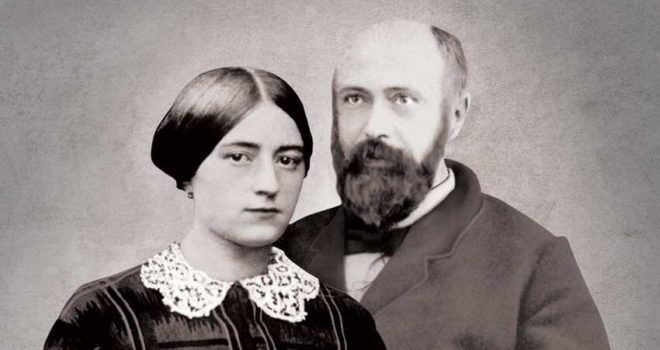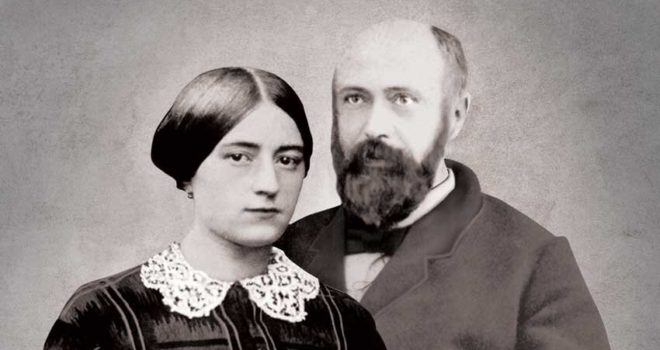I have long loved St. Therese of Lisieux, but my love for her mother has grown as I have grown as a mother myself. In my defense, when I first became a mother, St. Zelie wasn’t canonized, yet, and I only knew of her through St. Therese.
Relating to Zelie as a Wife and Mother
St. Zelie first became real to me when I read the book that St. Therese’s sister, Celine, wrote about their mother, The Mother of the Little Flower. The Zelie that I met in that book was real and relatable. She worked through navigating discernment with her husband, she loved her children to bits, and she wasn’t afraid to express frustration and overwhelm at the antics of her little ones. Zelie’s sister was in the convent, and she and Zelie corresponded often.
In these letters, we see Zelie facing so many of the normal things that mothers face. She talks about her astonishment and frustration that, despite her best efforts, her children didn’t immediately want to be holy. (Any parent pacing with a restless toddler in the back of Mass, wondering what they are doing wrong as a Catholic parent, can relate.) She tells everyday stories of them, especially her youngest, Therese. Therese was full of life, a veritable handful of a toddler, and her mother loved her to pieces. The classic story that Zelie told was of how St. Therese used to come down the stairs. Little Therese would stop on each step on the way down and yell, “Mama!” Then she would only take the next step if her mother responded. As a mother of a child who is almost nine years old and still yells, “Mommy!” if I venture down to the basement laundry room without telling her, I can relate.
But also relatable was Celine’s description of her parents’ marriage. As is the case in any healthy marriage, not everything was smooth sailing. To begin with, neither Louis nor Zelie expected to be called to the vocation of marriage. Zelie, always having the heart of a mother, embraced the vocation more quickly, seeming to understand that the married vocation had to be a sort of seamless weaving together of prayer and ordinary life. Poor Louis struggled more with that balance, wanting at first to have a Josephite marriage (that is, one without consummation), to imitate monastic life more closely. It wasn’t until Zelie dragged him to their priest for help with discernment that Louis was able to see that consummation in marriage (and the children that could come from it) was indeed a good and fitting thing! Had it not been for St. Zelie’s insistence that they further discern the physical side of their marriage, we might never have had St. Therese of Lisieux!
Balancing Her Family’s Needs
Now in my life, I find myself relating to Zelie in a whole new way, though – as a working mother. Before meeting Louis, Zelie was trained as a lace-maker. Her skill and training were so advanced that it would be more accurate to describe her work as that of an artisan. When they married, Louis worked fixing watches. It quickly became apparent that her skill was exceptional and paid better, and so Louis quit his work so that he could work full time supporting her lace making business. Nowadays, this sort of arrangement is not unusual. Women frequently start businesses that take off, and then their husbands quit their jobs to help grow the business. But Louis was ahead of his time, in recognizing not only his wife’s skill, but having the humility to admit that her business bore more fruit than his and was worthy of his support.
Zelie, too, was ahead of her time. She eventually employed a whole network of women lace-makers, coordinating their contributions and seeing that they were paid for their labor. Furthermore, she did this in such a way that the women could often work from home, still enabling them to be with their families. In other words, the work she facilitated struck that fine balance that women long for – to both be present to their families while also having work they enjoy and do well. (Most modern places of work still haven’t achieved this balance!)
For the first time, I will not be homeschooling any of my children this year. They will be going to a wonderful little Catholic school, and in the scramble to cover their tuition, I have found myself taking on more work than usual. I have worked throughout my years of homeschooling them, but my workload is substantially increasing now, and necessarily so. Like Zelie, the work that I am undertaking (which, thankfully, is all work related to my training and experience in theology and catechesis) I am doing for the sake of providing for my children.
But I am sure that Zelie had moments like the ones that I (and all working mothers face). Am I giving my children enough attention? Am I going to be able to keep track of everything that needs to be done? Will I miss important moments in my child’s life? How am I going to get it all done?
And as I feel my own growing anxiety over these questions, I find myself turning again to St. Zelie. I turn to her in the way that I would turn to an older sister, or a more experienced mom friend. And, as I feel whenever I turn to a friend who understands, I find comfort in knowing that she “gets” it, and she will be praying for me. With her friendship, I know that I am not alone.
✠













